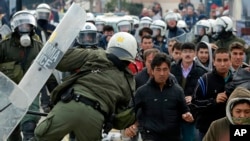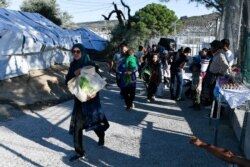Greece plans to build a floating barrier off its Aegean coastline to deter migrants from Turkey, amid a surge in arrivals in recent months. The plan has drawn strong condemnation from human rights groups.
WATCH: Henry Ridgwell's video report
Almost 60,000 migrants arrived by sea onto Greek shores from Turkey in 2019, nearly twice the number that arrived the previous year. Last week the government advertised an offer for the construction of a net barrier in the sea off the island of Lesbos, which lies just a few kilometers from Turkey.
At 2.75 kilometers long, the barrier would rise above the surface of the water and have flashing lights to warn would-be migrant boats. The estimated cost is more than $550,000.
“This plan could put lives at risk,” says Massimo Moratti of human rights group Amnesty International. “Building a barrier, a floating wall in the sea can make it more difficult even for the rescuers to go and rescue these boats and cause problems with the people landing.”
The Greek government argues the sea barrier would act as a deterrent to people smugglers and would be safety-tested before installation.
The surge in arrivals since August is putting huge pressure on the Greek islands. Moria camp on Lesbos Island was built for 3,000 migrants but is holding more than 19,000 people. Amnesty says conditions in the camp are overcrowded and unsafe.
Both migrants and Greek residents of the island have staged protests in recent days demanding that the camps be closed and the migrants moved off the island. “
We stand by them in whichever way we can,” said protester and Lesbos resident Zoi Giannaka, “but we want these people to leave, not because they bother us or because we don’t love them, but because they live in a way that is inhumane.”
Over 60 migrants died attempting the sea crossing from Turkey to Greece last year alone. The United Nations and the European Union have warned Greece to abide by international law.
“Every state, including Greece, has a legitimate right to manage their borders, but those that are coming across the sea with the intention of seeking asylum, safety, they have a fundamental right to do so,” said Boris Cheshirkov, a spokesperson for the United Nations High Commission for Refugees (UNHCR) in Greece.
The number of arrivals in Greece in still far below its peak in 2015 when 885,000 migrants arrived on its shores, many fleeing the war in Syria.







